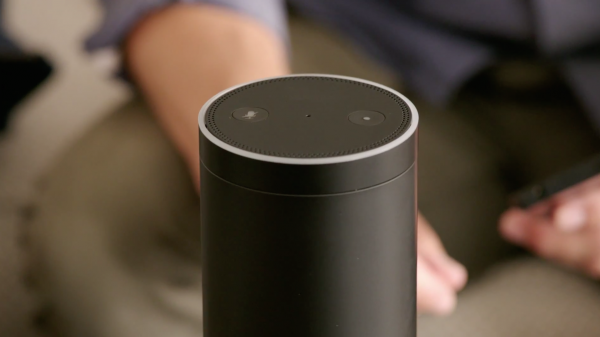Amazon Echo Booms

I so requested to buy Amazon Echo, which promises to bring Star Trek-like responsive computing to the home. The cylindrical device, announced today, is a Bluetooth- and WiFi-enabled speaker that responds to users' questions. Just say "Alexa" and ask something. "What's the weather?" "What is the largest dinosaur?" This is how search information should be, assuming Echo resounds as strongly as Amazon's product information and demo video claim.
Touchless interaction is by no means new. Apple got the jump with personal assistant Siri, which responds to requests and commands on iOS devices. Google Now, available on multiple platforms, is far superior, and Windows Phone now has Cortana. All three cloud-based touchless-response systems make your voice the primary user interface. But Echo, like the Moto X smartphone, is always listening, such that the interaction is almost completely hands-free. That's the difference.
Touchless is exactly what consumers need from a personal mobile, and many other everyday devices packing chips and operating systems. While humans are tool users, for which touch interfaces make sense, the ability to communicate with language sets us apart from all other species. What is more familiar than talking, and expecting response because of it?
Amazon takes a smart approach—and novel one for a retailer that's principle business isn't tech devices. The company seeks to put Echo into the homes of customers who really want it. You must request an invite to purchase, and the price is discounted by half to $99 for Prime members—for a limited time. The tactic is shrewd because:
- Invite-only creates cool cache around Echo; buzz, baby
- Amazon can work out the kinks by treating buyers as paying beta testers
- The retailer can build buzz where it counts—among "verified purchasers" and the reviews they write
- Customers are more reliable (and believable) reviewers than the Apple-obsessessed tech blogs and media
- Many Prime Members already participate in the Amazon lifestyle (e.g., purchases and owning other devices)
If Apple had unveiled something like Echo, the blogosphere would boom with crazy praise for such innovation. There also would have been rumors galore beforehand. In typical Amazon fashion, Echo makes a rather quiet and unassuming debut. Meanwhile, bloggers utter a collective "Huh?"
My book The Principles of Disruptive Design, which badly needs to be updated (sorry about that), puts touchless-interaction at the forefront of the next user interface evolution. I fault Apple for doing so much for touch but failing to transcend it. Nokia, inventor of the smartphone, had similar problem transitioning to touch, losing the category first to iOS and then also Android.
The most successful companies, like the people who create them, share several common traits. One is consistent: The willingness to take risks. Great design, particularly for products that disrupt existing categories, or create new ones, is all about risk. True design genius brings to market something people don’t know they want, or even need. But seeing, they experience the Grok moment of realization.
For example, Apple took great risks bringing iPhone to market:
- The category was crowded
- Nokia dominated the global landscape
- The smartphone launched on a single carrier in one country
Risk defines Apple's approach to technology and user interfaces, going back to Macintosh 30 years ago. But the R word is something missing since Steve Jobs' death—actually since iPad's launch in Spring 2010.
Amazon is a surprisingly shrewd risk-taker, and one that rarely receives the credit deserved. CEO Jeff Bezos runs an amazingly aggressive innovator, by many measures. So many I can't chronicle them all. But I would be remiss not to name a few:
- The original concept, selling books online, that rode the dot-com boom and survived the bust (1995)
- Amazon Web Services, which extends the core cloud infrastructure availability to other businesses (2002)
- Amazon Prime, the subscription service offering free shipping then expanding benefits over the following 9 years (2005)
- Kindle Reader and ebooks, which risked cannibalizing the foundational book business (2007)
- Kindle Fire and Android App Store, defying Google's ecosystem and offering digital lifestyle similar to Apple's (2011)
- Fire TV, which entered a crowded set-top box market but enhanced the user experience with voice search (2014)
This is a super short list of risk-taking, disruptive decisions, and the majority offer something users wouldn't necessarily know they needed until seeing it. That measure is the truest definition of innovation.
Echo looks promising. The concept is excellent, but the devil is in the details, which can't be evaluated without first using the device. I'm anxious to try.